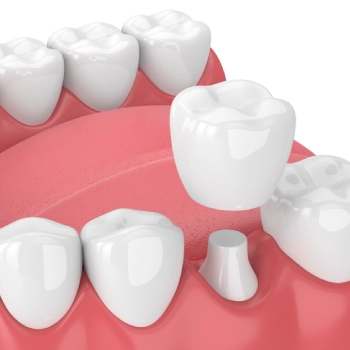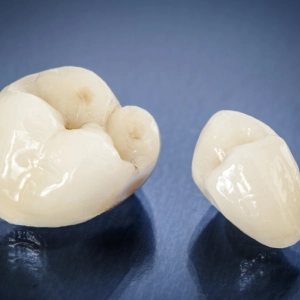Yes, a dental crown can potentially damage a tooth if it is not properly fitted or maintained. While crowns are commonly used to protect and restore damaged teeth, they can sometimes contribute to issues such as decay or fracture if not managed correctly. Like any dental restoration, crowns require proper care and maintenance to ensure longevity and effectiveness. If you are experiencing any issues with your dental crown, such as decay, fractures, or discomfort, don't hesitate to consult your dentist. With timely intervention and appropriate treatment, many crown-related problems can be addressed, allowing you to enjoy a healthy, functional smile for years to come.
What is a Dental Crown?
A dental crown is a prosthetic device placed over a tooth to restore its shape, size, strength, and appearance. It encases the entire visible portion of a tooth above the gumline, providing protection and reinforcement. Crowns can be made from various materials, including porcelain, metal, or a combination of both, depending on the patient's needs and preferences.
Why Do You Need a Dental Crown?
There are several reasons why a dentist might recommend a dental crown:
Protection:
Crowns are used to protect weak or damaged teeth from further deterioration. This could be due to extensive decay, fractures, or large fillings that compromise the tooth's structural integrity.
Restoration:
Teeth that have undergone root canal therapy often require crowns to restore their functionality and appearance. Since the nerve and blood supply have been removed during the procedure, the tooth becomes more brittle and prone to fracture.
Cosmetic Enhancement:
Crowns can also be used for cosmetic purposes to improve the appearance of misshapen, discolored, or poorly aligned teeth, enhancing the overall aesthetics of the smile.
What are the Procedures for Getting Dental Crowns?
The process of getting a dental crown typically involves several steps:
Consultation:
Your dentist will examine your teeth and discuss the reasons for needing a crown. X-rays may be taken to assess the extent of the damage or decay.
Tooth Preparation:
To accommodate the crown, the affected tooth is reshaped by removing a portion of its outer layer. This step ensures a proper fit for the crown.
Impression:
An impression of the prepared tooth is taken to create a customized crown that matches the size, shape, and color of your natural teeth.
Temporary Crown:
While the permanent crown is being fabricated in a dental laboratory, a temporary crown is placed over the prepared tooth to protect it.
Crown Placement:
Once the permanent crown is ready, it is cemented onto the tooth using dental adhesive. Your dentist will ensure proper alignment and bite before finalizing the placement.
Common Dental Crown Problems and How to Fix Them
Despite their benefits, dental crowns can sometimes lead to complications:
Tooth Decay:
If the margins of the crown do not fit snugly against the tooth, bacteria can accumulate in the gap, leading to decay. Regular dental check-ups and proper oral hygiene can help prevent this
issue. In some cases, replacing the crown may be necessary to eliminate the decay and restore the tooth's health.
Fractures:
Crowns can fracture or break under excessive force, especially if the underlying tooth structure is weak. Avoiding hard or sticky foods and using protective mouthguards during sports can minimize the risk of crown fractures. Depending on the extent of the damage, the crown may need to be repaired or replaced.
Gum Recession:
Improperly fitting crowns or inadequate oral hygiene can cause gum recession around the crowned tooth, exposing the tooth's root and increasing the risk of sensitivity and decay. Scaling and root planing may be recommended to address gum recession, and adjustments to the crown can help improve its fit.
Loose Crown:
If the cement holding the crown in place weakens over time or if there is underlying tooth decay, the crown may become loose or dislodged. Prompt dental intervention is necessary to re-cement the crown and assess the underlying cause of instability.
Conclusion: Are You Facing Dental Crown Problems?
Dental crowns offer invaluable benefits in restoring and protecting damaged teeth, but they can sometimes present challenges if not properly cared for. Whether you're dealing with decay, fractures, or discomfort related to your dental crown, if you're experiencing any issues with your dental crown or seeking guidance on maintaining your oral health, we invite you to visit our website at Dental 1 Care. Take the first step towards a healthier, happier smile by scheduling a consultation with us today. Your journey to dental wellness begins here.






